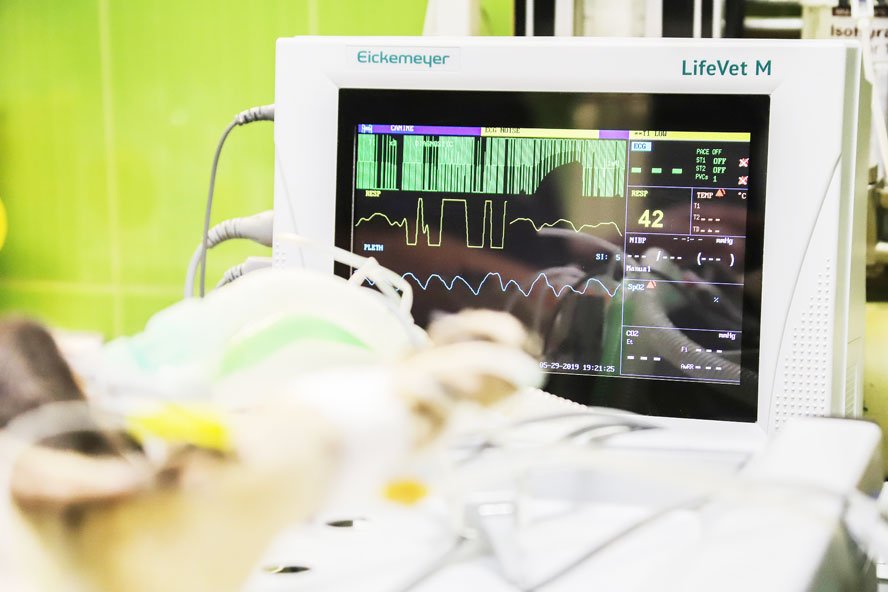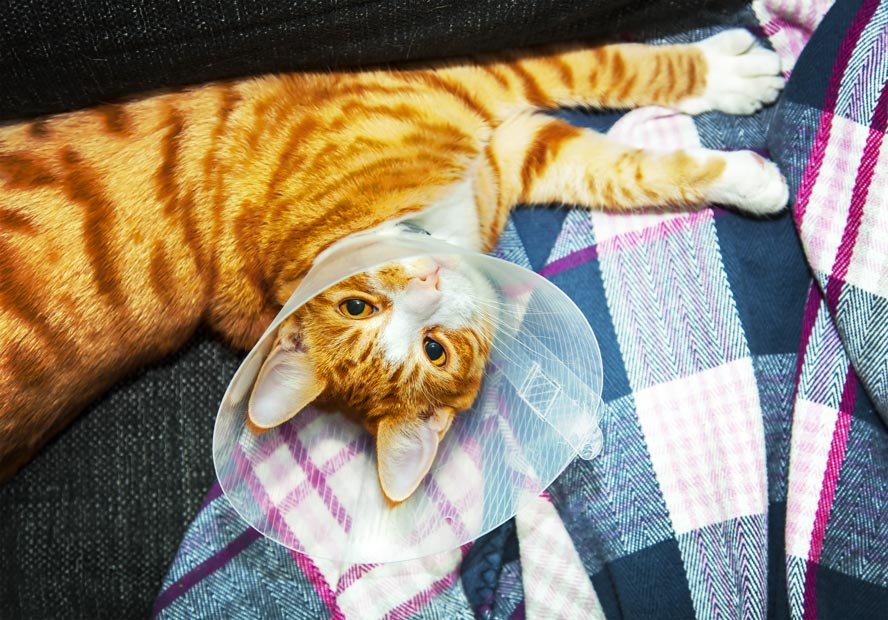cover: Aleksandar Cvetanovic | Shutterstock
What to do if the cat does not recover after anaesthesia? Almost every cat is put under anaesthesia at least once in its life, even if it is "only" for a castration or a dental cleaning. When the cat returns home, it often behaves differently and takes a while to get back to its old self. But there's no need to panic, this is usually quite normal. Rarely is there a medical problem underlying it that needs to be treated by a vet.
This article explains what kind of behaviour is normal after your cat has had a general narcosis and you get tips on how to take good care of your pet. Learn to recognise problems and act correctly so that your cat gets well again quickly.
mirkosajkov | Pixabay
Is anaesthesia dangerous for my cat?
No, general anaesthesias are very safe nowadays. This is because the drugs, methods and equipment have been improved and developed over time. For each individual patient, there is a risk assessment and anaesthetic protocols that the vets can follow. This is very important because high-risk patients need to be monitored differently. Cats with a pre-existing condition have a ten times higher risk of anaesthetic emergency than healthy cats. This is because a general narcosis always has an effect on the cardiovascular system and respiration. If these organ systems are already damaged, breathing stops and a very slow or irregular heartbeat are more common.
It is interesting that the risk of anaesthetic emergency in cats is somewhat higher than in dogs. On one hand, this is due to their smaller size. During anaesthesia, the body cannot maintain the temperature and loses temperature. The smaller the animal, the faster it cools down. Hypothermia can cause heart failure and causes the drugs to be broken down more slowly. In addition, the cat's liver works differently. It metabolises some medicines in a different way than the dog's liver and excretes them more slowly. This can increase and prolong the effect. Another problem is that cats are more difficult to examine than dogs and hide many symptoms. This means that the veterinarian cannot always adequately assess the cat's health before anaesthesia and recognise pre-existing conditions.
How long does anaesthesia last in cats?
The duration of an anaesthesia depends entirely on the method of anaesthesia used, the medication applied and the surgery itself. But one thing is for sure: when you pick up your cat from the vet's office, it should be responsive again, able to swallow, blink and move on its own. It doesn't matter what type of anaesthesia was used on it.
Nevertheless, it is completely normal for it to continue to be sleepy, somewhat confused and dizzy - this may well last until the next day. The main effect of the anaesthetic has passed, but it takes longer for the body to completely break it down and excrete it. Only then the coordination will work perfectly again.
You can help your cat wake up. Prepare a clean, padded bed on the floor for it to lie on. It's best to cover it with an absorbent pad, as sometimes cats throw up or defecate after anaesthesia. You can also put a hot water bottle (not too hot) in its bed or cover it with a blanket to prevent it from getting cold. Hypothermic animals take longer to wake up and get rid of the medication. However, make sure it can breathe easily and do not cover its head. When your cat is allowed to eat again, put food and water next to it. The litter tray should not be too far away to save energy. Keep a close eye on your cat in the first few hours after anaesthesia, be there for it, but let it sleep it off.
olivierk5 | Pixabay
Cat tired for days after anaesthesia
It can happen that cats are tired for several days after the operation and sleep more than usual. Sometimes it takes longer for the anaesthetic to be completely broken down and excreted by the body. This is especially affects cats that are obese or have a history of heart, liver or kidney disease.
It can also happen in exceptional cases that cats unintentionally get a little more anaesthetic than is necessary. As a rule, each cat is weighed and thoroughly examined before the procedure and the anaesthetic is adjusted accordingly. However, with very wild animals this is sometimes impossible and the vet can only estimate the weight.
Another reason for persistent tiredness is the operation itself. Cats often sleep more afterwards because the body needs to regenerate. The energy that would otherwise be used for exercise and play is then available for wound healing. And less exercise is also beneficial to help the skin, bones and other tissues grow back together better.
Is it normal for the cat to stagger after the narcosis?
When the cat is still under the influence of the anaesthetics, its coordination is also affected. Only when it has completely slept off the "intoxication" everything will function again as before. Therefore, it is important that it is not exposed to any danger until this time. The cat bed should be on the floor, stairs or other trip hazards should be out of reach. You can also put your cat in a room with few jumping opportunities and where it is dark and quiet. Remember to provide a cat litter box as well as water and food as soon as your cat is allowed to eat again.
Jeffrey Blum | Unsplash
My cat shows a change in temperament after anaesthesia
Does your cat behave differently after a narcosis? Does it hide a lot, is it hyperactive, fearful or even aggressive? There are several reasons for this. Firstly, the stay in the vet practice and the operation can be a traumatic experience for some cats. They are in an unfamiliar place, surrounded by strange people, noises and smells. This can cause severe stress and lead to behavioural changes. Give your cat some time to calm down.
Here are a few tricks to reduce stress:
Cat carrier:
The carrier should be an everyday item and not just taken out when the vet visit is due. For example, it can be used as a sleeping cave in the room. Regular training with treats can also help your cat enjoy getting into the carrier.
Familiar smells:
On the day of the operation, you can bring a cuddly blanket or a T-shirt from home, because the familiar smell will calm your cat.
Bring your cat its own food:
If your cat has to stay a little longer in the practice or clinic, you can also bring the food it is used to at home.
Short stay:
In order to keep your cat in the unfamiliar environment as short as possible, pick it up as soon as possible after the procedure. The vet practice will notify you as soon as it is awake again.
Relaxation through cuddle hormones:
If your cat is very stress-prone, you can use Feliway® at home. It is a so-called pheromone that is vaporised and has a calming effect on cats. It mimics scents that cats excrete to reassure each other that all is well.
Another reason for a change in your cat's behaviour after anaesthesia is pain. The tissue affected by the operation is swollen and hurts, especially in the first few days after the surgery. If you've had an operation yourself, you might have already experienced this - it's the same for animals. Pain is also a reason why some cats do not want to eat properly after an operation. For this reason, your pet should be given pain medication for several days and should move as little as possible. Extensive romping and playing will have to wait for a while.
My cat's eyes look strange after the surgery
Are your cat's eyes all pasted up after the operation? Don't worry, there is nothing wrong with them. Due to the anaesthetic used, the blink reflex does not work, which can cause the eyes to dry up and develop small injuries. Therefore, they have to be kept artificially moist and eye ointment is applied at the beginning of the operation. This is usually a care ointment that does not contain any drugs such as antibiotics. Your cat will clean off the excess ointment itself as soon as it does its first thorough body wash.
Another phenomenon that some cats show after anaesthesia is a bilateral prolapse of the nictitating membrane. The nictitating membrane is the third eyelid that is pushed in front of the eyes as a white membrane because all the muscles relax during the anaesthetic. This can last for a few hours after waking up and goes away on its own.
Sophie McAulay | Shutterstock
When to visit the vet?
Only in the rarest of cases is it necessary to visit a veterinary practice again after the anaesthetic. Cats are usually fully awake and back to themselves within one to two days. Give your cat time to recover and rest. If it has been given a collar or bodysuit to protect the surgical wound, do not remove it! Too often, cats without any protection will open the wound and need to be operated on again. To make it easier for your cat to use the collar, you can remove the lid of the litter tray and remove chairs or anything else it might get stuck on.
There are few cases when you should go to the vet's office after surgery, even if you do not have a follow-up appointment. If your cat is still not eating 2 days after surgery, the cause needs to be found. Maybe the painkiller isn't working or she needs one - your vet will be able to help. Feeding is important to keep your cat strong and fit. Another reason is a badly fitting bandage. If the bandage has slipped off when the operated leg should not be moved, it must be replaced. Even if the bandage is too tight, it can hurt your cat and cause sores. A clear indication that the bandage is too tight is if your cat stubbornly tries to get it off.
Conclusion
General anaesthesia is very safe in cats. They are routinely performed, well prepared and monitored. Any vet must tell you about the risks of anaesthesia beforehand. Don't be afraid to ask further questions.
Once your cat has been anaesthetised and is back home, you should stay with it for the first few hours and make sure it doesn't hurt itself. The after-effects of the narcosis may last a little longer. Offer love, attention and rest and your cat will be back to its old self in no time.
The confidu magazine is written by our veterinarians according to current scientific standards. The articles do not replace a veterinary diagnosis, but are intended to provide you with initial information on many topics related to your animal. If you have specific questions about your pet, our vets will be happy to advise you via the confidu app.









